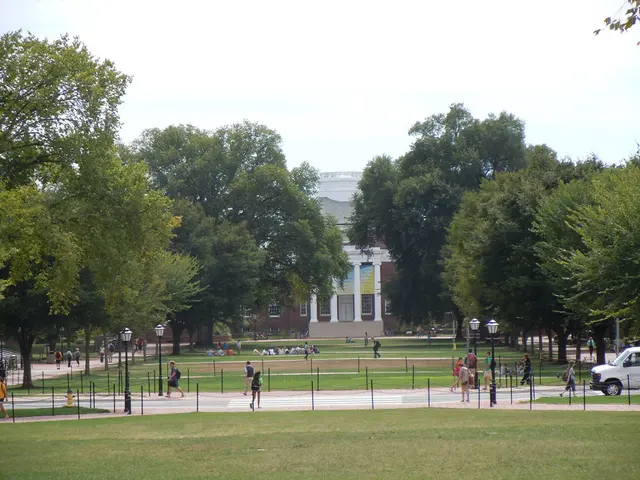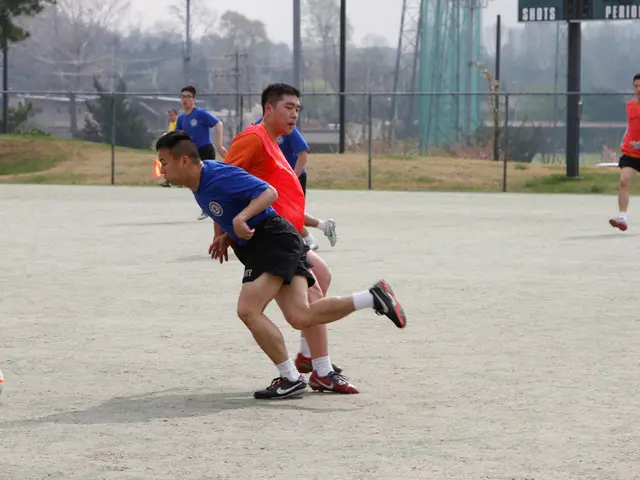Diplomats Merz and Macron aim to resolve the arms conflict no later than August's end.
In a significant development, German Chancellor Friedrich Merz and French President Emmanuel Macron held a meeting in Germany, marking Merz's first visit since his government change on May 6. The discussion between the two leaders covered a range of topics, including the future of the joint combat air system project, FCAS, and the ongoing trade dispute with the US.
The FCAS, valued at over €100 billion, aims to develop a next-generation fighter jet to replace the Rafale and Eurofighter fleets by 2040. However, tensions have arisen due to France's request for a significant share in the project, potentially giving it 80% control over the strategic value of the program. This has caused concern among German stakeholders, who fear their contributions could be marginalized, leading to potential delays or even a collapse of the program.
The leaders agreed to address the outstanding issues by the end of August. The defense ministers from both countries have been tasked with evaluating the future of cooperation within the FCAS consortium and submitting proposals to resolve existing conflicts. If successful, the FCAS program could see a first flight in 2029, with development completion by 2035 and production starting in 2040.
In the trade dispute with the US, Merz and Macron demonstrated their determination to respond with countermeasures to any possible US tariffs. The leaders also expressed concern and appealed for a ceasefire and urgent humanitarian measures in the ongoing conflict in the Gaza Strip.
The dispute over the FCAS has been a significant point of contention, with France seeking 80% involvement in the project, which is not acceptable to Germany. Reports suggest that Dassault, a French company involved in the project, is seeking this level of involvement. However, the German expectation is that Dassault will adhere to existing agreements regarding the FCAS project.
The meeting took place at a villa on the Tegeler See, which once belonged to the industrialist family Borsig and is now a guesthouse of the Foreign Office. The leaders emphasized their commitment to deepening their cooperation at all levels, aiming to continue the work started on strengthening Franco-German relations.
Negotiations between the EU and the US to prevent the imposition of tariffs of 30% on EU goods from August 1 are still ongoing. The US wants to impose these tariffs, but the EU is working to prevent this with a trade deal. The leaders did not discuss the internal political situation in Ukraine during the meeting, but they plan to discuss it with Ukrainian President Volodymyr Zelensky in the future, with a view to Ukraine's EU ambitions.
The FCAS is intended to become operational from 2040 and replace the Eurofighter. According to the existing agreements, Dassault, Airbus Germany, and the Spanish company Indra are to be involved in the project to an equal extent. A joint cabinet meeting of the two governments will take place in the southern French city of Toulon on August 28 and 29.
Sources: [1] https://www.reuters.com/world/europe/merz-macron-meet-first-time-german-chancellor-since-may-2023-07-11/ [2] https://www.bloombergquint.com/global-economics/germany-france-dispute-over-fighter-jet-project-raises-stakes-for-eu-defence [3] https://www.defensenews.com/global/europe/2023/07/11/france-germany-agree-to-resolve-fcas-dispute-by-august-end/ [4] https://www.dw.com/en/france-germany-to-resolve-fcas-dispute-by-end-of-august/a-62596039
- The ongoing FCAS project, a joint endeavor worth over €100 billion, aims to develop a next-generation fighter jet.
- Tension has arisen over France's request for a significant share in the FCAS project, potentially giving it 80% control.
- German stakeholders fear their contributions could be marginalized due to the request for a large share in the FCAS project.
- The leaders agreed to address the FCAS conflicts by the end of August.
- Defense ministers from both countries have been tasked with evaluating the future of cooperation within the FCAS consortium.
- If successful, the FCAS program could see a first flight in 2029 and production starting in 2040.
- The leaders demonstrated their determination to respond to any potential US tariffs in the trade dispute.
- The leaders expressed concern and appealed for a ceasefire and urgent humanitarian measures in the ongoing conflict in the Gaza Strip.
- Negotiations to prevent the imposition of tariffs of 30% on EU goods from August 1 are still ongoing.
- The US wants to impose these tariffs, but the EU is working to prevent this with a trade deal.
- A joint cabinet meeting of the two governments will take place in Toulon on August 28 and 29.
- According to the existing agreements, Dassault, Airbus Germany, and the Spanish company Indra are to be involved in the FCAS project to an equal extent.
- Reports suggest that Dassault is seeking a level of involvement that may cause concerns among German stakeholders.
- The German expectation is that Dassault will adhere to existing agreements regarding the FCAS project.
- The meeting's location was the villa on the Tegeler See, once belonging to the Borsig industrialist family.
- The leaders emphasized their commitment to deepening their cooperation at all levels.
- The discussions covered the future of the joint combat air system project, FCAS, and the ongoing trade dispute with the US.
- The defense ministers are expected to submit proposals to resolve existing conflicts in the FCAS consortium by the end of August.
- If the FCAS project is successful, it could potentially lead to the replacement of the Eurofighter from 2040.
- A first flight is planned for 2029, with development completion by 2035 and production starting in 2040.
- The ongoing conflict in the Gaza Strip was a point of concern for the leaders, who appealed for a ceasefire and humanitarian measures.
- Despite not discussing the internal political situation in Ukraine during the meeting, the leaders plan to discuss it with Ukrainian President Volodymyr Zelensky in the future.
- The leaders' commitment to deepening their cooperation includes continuing the work started on strengthening Franco-German relations.
- The European Union's ambitions for Ukraine were not discussed during the meeting, but they will be discussed in the future with Ukrainian President Volodymyr Zelensky.
- Sources suggest that the FCAS project could face delays or even a collapse due to potential conflicts over control and cooperation within the consortium.





